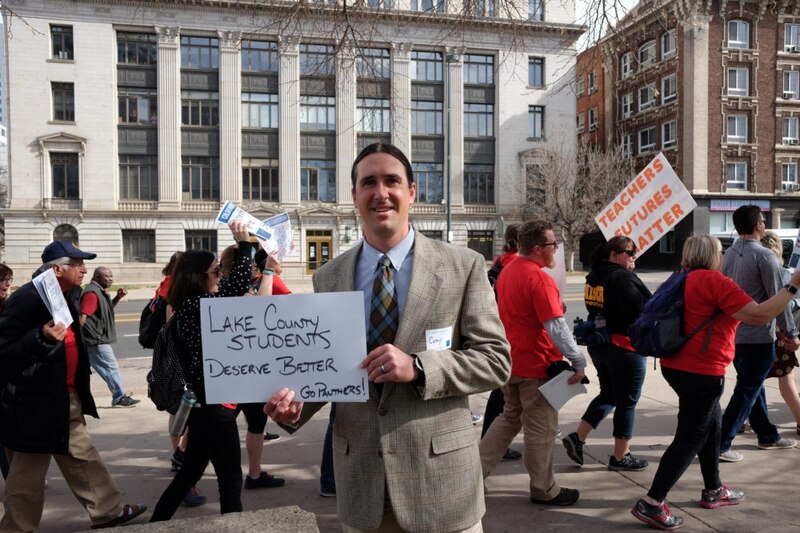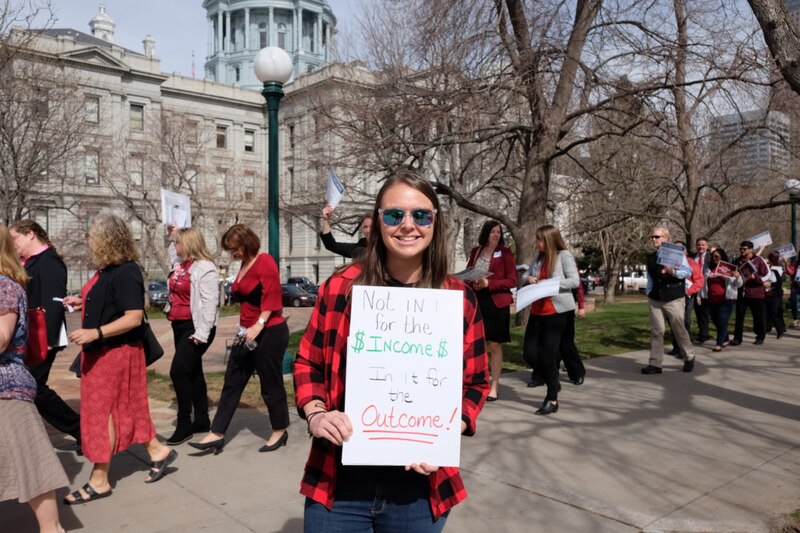Chanting “Education is a right! That is why we have to fight!” and “Whose schools? Our schools!” several hundred teachers came to the Colorado State Capitol Monday to call for more school funding and to defend their retirement benefits. They marched down Colfax Avenue and around the Capitol building before filling the halls to lobby legislators and rallying in the rotunda.
Emboldened by teacher strikes and walkouts across the nation, a majority of the teachers from the suburban Englewood district joined the day of action, forcing the district to cancel classes, but the protest was a small shadow of the labor unrest among educators in other states.
In interviews, teachers said they recognize the state’s fiscal constraints. The Taxpayer’s Bill of Rights places a constitutional cap on how much the state budget can grow, even when the economy is good, and requires voters to approve all tax increases. In the afternoon, House Democrats told teachers to go back to their communities and urge voters to approve a major tax increase that could appear on the November ballot.
We asked teachers why they were marching, and this is what they had to say:

Cody Jump teaches government in rural Lake County, where health insurance rates are among the highest in the country and schools have a hard time filling open positions.
Low pay contributes to high teacher turnover, he said, and if changes to the state public employee retirement system are too onerous, he thinks many younger teachers will leave the profession.
The Democratic-controlled House is currently putting its own stamp on a bill that aims to address an unfunded liability in the state pension system of between $32 billion and $50 billion. The version that came out of the Republican-controlled Senate raises the retirement age, limits cost-of-living raises for retirees, and asks current teachers to pay more. Amendments put on in the House make the bill friendlier to teachers, but the final version still needs to be hashed out.
“We’re trying to stabilize our profession and bring a sense of dignity to teaching so our kids can have the stable schools they need to thrive,” he said.
Jump said he has two young children, and he and his wife use several forms of public assistance just to get by, including visiting a monthly food bank.
“If we miss that, our pantry is in trouble,” he said. Enough teacher families use the food bank that it’s become a social gathering spot for their spouses.
If something doesn’t change, he said, the quality of education will suffer.
“There are good, high-quality teachers who just will not come here,” he said. “I don’t want my son to spend a decade in a school system full of people we had to scrape together.”

Amy Nagel is a physical education teacher in an Englewood elementary school, just south of Denver. Her biggest concern is the lack of mental health services and counselors in schools. Many of the children she teaches come into school having already experienced trauma in their young lives, she said, and they need counseling and support before they can learn well.
“There is a misunderstanding that we’re asking for pay raises,” she said. “This is 100 percent about making sure that our schools are funded. We deserve pay raises, but we’re here for our kids.”
The decision by Englewood teachers to leave school en masse was inspired in part by teacher action in other states, she said.
“I think the government is really hoping we will be teachers to our core and be quiet and keep the peace,” she said. “I hope that teachers see the activism and know that they’re supported and know that interrupting a little bit of a child’s education to impact decades of education is worth it.”

Kathryn Brown is a counselor at an alternative high school in the Englewood district. She said she’s marching for more school funding and to protect retirement benefits.
“I feel very fortunate because my school values the mental health professionals who work there, but it’s often one of the first things cut,” she said. “So when we’re talking about school funding, we’re not just talking about academics. We’re talking about educating the whole child.”
If retirement benefits become less generous, younger teachers and counselors “absolutely” will leave the profession, Brown said.
“We don’t get paid very much, but at the end we’re promised a good retirement,” she said. “And I want my retirement.
Like many of her colleagues, Nagel has a master’s degree and student loans she can’t pay off.
“That’s okay because I love to do what I do, but at some point new educators, new counselors are going to say, this is it, it’s not worth it,” she said.
Brown said Englewood teachers were inspired by teachers in Oklahoma and West Virginia.
“It emboldened our teachers and gave us a lot of courage because we’ve seen it in other states,” she said. “I think educators are fed up with not being valued and not being paid.”

